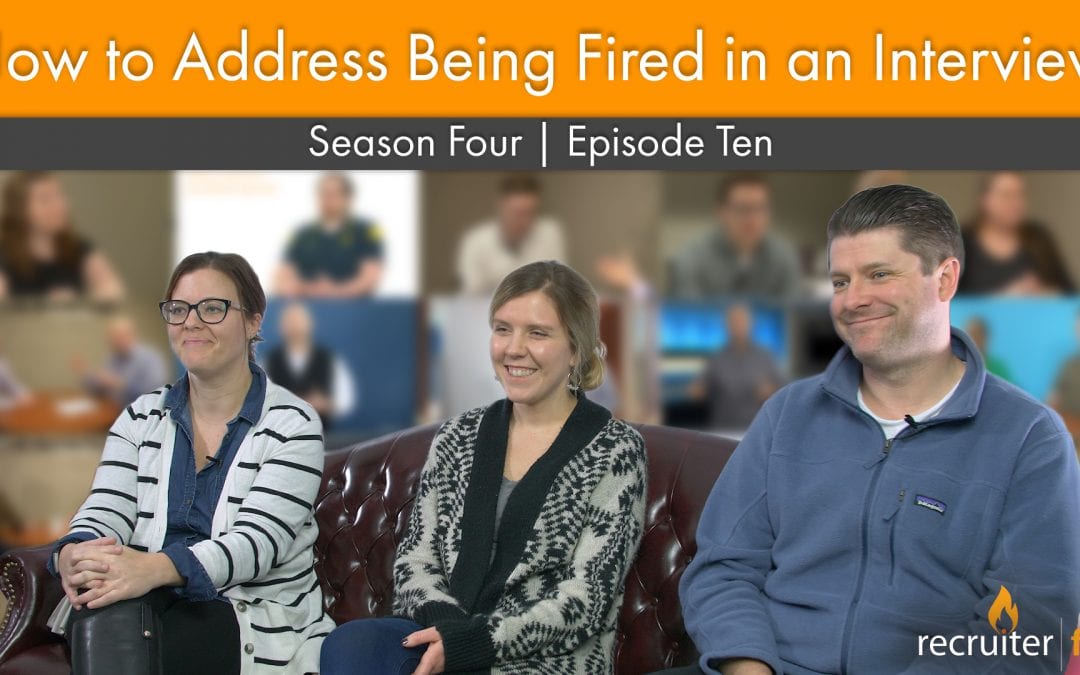
Season 4, Episode 10:
How to Address Being Fired in an Interview
This week on Recruiter Fuel,Steve sat down with Recruiters Melissa and Andrew and brought in Megan to give some advice to her friend. A few weeks ago, Steve received an email from Megan, an Administrative Assistant at Qualigence, inquiring about some advice for a friend who was having some difficulties in the job market.
“Basically, a friend of mine, who has her master’s degree, held a job at a major university for about five months and then was recently let go due to biases that they believed were out of her control.”
Megan went on to explain these “biases”, “it was comments that were made in the workplace that management didn’t find appropriate, but management also felt that my friend didn’t realize it was inappropriate. At a major university in a department that deals directly with students, you have to be very careful.”
This is where Megan’s email came into play. It’s been about a month since the incident happened and her friend has been struggling to find a new job, not only a job pertaining to her major but any job at this point.
When you are let go from a job, what should you say and not say on your resume and in a job interview? How do you find success after you’ve been fired?
“When you see someone, who is not currently working, from a recruiter’s perspective, how do you look at it?” Steve asked. Melissa responded, “As a recruiter, you should be going into it pretty open. Withhold from any prejudgments until you’re asking the candidate what happened.”
“What’s the common response from managers that you guys (recruiters) deal with when they see a candidate has been unemployed for 30 days, 60 days, etc..?”
Andrew quickly replied that managers think they must not be that good. He continued, “The first thing I’ll ask when a candidate says they were fired is, ‘Was it just you that got let go or how many others did as well?’, if it’s something like 250 people, not a big deal. If the candidate was the only individual let go or if they had a story similar to the one Megan explained, I would write down verbatim what they said so that I can coach them on it later if they get to the interview.” Andrews believes that being direct with the hiring manager about being let go is the best thing a candidate can do.
“What advice would you give a candidate that was let go for something that could be considered damaging to the market that they are in?”
Melissa’s advice? Be upfront and honest, but to a point where you’re not going to bash your previous company. It’s important for the recruiter to coach the candidate on how to talk about the situation honestly, but in an effective way that won’t hurt the candidate during the interview or put them in a bad position.
Steve asked, “How do you pose someone’s situation, that is similar to Megan’s friend, in the right way to be fair to the employer they’re going to?”
Where is the balance between the candidate being honest, but also trying to move past the situation?
The candidate needs to confront the situation as, “here was what I did, here was my response about the situation, here is what I learned, and here is what I would do over again or next time. Steve agreed, “if you hide it, the issue could come out during a background check or legality issues could be involved.
Speaking as an employer myself, I’ll take a chance on somebody if they come to me and say, ‘Here’s what I did, this was viewed as the wrong thing. Here is what I learned from it, so this is never going to happen again.’ I’m more likely to take chance on someone who approaches the issue like that, rather than just saying they were fired and doesn’t give a lot of particulars behind it.” Being vague will stir up more questions in the employer’s mind so it’s important to cover all bases up front.
Andrew said that bringing it up and getting past it as soon as possible so you can talk about the rest of the skills and what else you can bring to the new job, rather than having a whole interview based around this one incident should be the candidate’s main goal.
On a job application, for someone who has been fired, is the word “terminated” too much for the reason they left their previous job.
“I don’t know how you not lie about it,” said Steve. Adding an explanation or saying, “talk to me for an explanation,” could help.
Melissa said to be honest and upfront. If you start the lie, it will follow you through the interview process and if you get to the end and they run a background check and find out, it will look even worse.
Andrew said that when a candidate tells a recruiter they were fired, a recruiter should handle it like a mother talking to their child when they did something wrong at school. “Ask ‘what did you do?’, following with question after question after question. Help the candidate practice with responding so that they do not get tripped up during their interview.”
“From a recruiter’s perspective, if you had a candidate with a situation similar to Megan’s friend, do you have an obligation to tell the hiring manager (client) why they were let go if the hiring manager never asked?”
Melissa and Andrew both agreed that it’s the recruiter’s responsibility to be upfront with the hiring manager. If the hiring manager finds out that the recruiter was aware of the situation and never said anything, that could upset the client and they might never work with you again and you’re left with a bad reputation. In today’s climate, something as big as “biases” absolutely needs to be brought up.
Advice to take away for Megan’s friend? Be honest but explain what happened without throwing the other organization under the bus and talk about the lessons learned!
About Recruiter Fuel
Recruiter Fuel is a weekly video series dedicated to all-things recruiting and talent acquisition. Learn More our mission and how you can submit a topic, be featured in an episode, or nominate an expert to guest star on an upcoming episode.
Visit the Recruiter Fuel series directory for more content.






I really liked your blog.Really thank you!